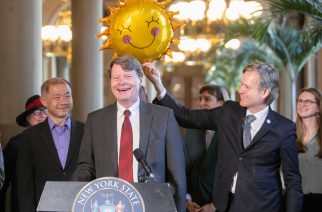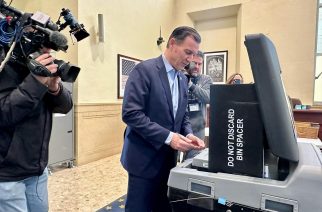
The first presidential debate held earlier this week left many Americans scratching their heads about where Donald Trump and Joe Biden stand on the issues.
For 90 minutes the president and the former vice president engaged one another in personal attacks and interruptions rather than focused debate and discussion.
The Commission on Presidential Debates, which sponsors televised debates for the benefit of the American electorate, was forced to issue an unprecedented statement warning it will likely change the format to avoid the interruptions and personal attacks.
“Last night’s debate made clear that additional structure should be added to the format of the remaining debates to ensure a more orderly discussion of the issues,” the CPD said. “[We] will be carefully considering the changes that it will adopt and will announce those measures shortly. The Commission is grateful to [moderator] Chris Wallace for the professionalism and skill he brought to last night’s debate and intends to ensure that additional tools to maintain order are in place for the remaining debates.”
However, it is unclear whether there will actually be a second and third debate this election season.
Donald and Melania Trump announced early Friday they tested positive for the coronavirus and will be in quarantine for two weeks. The second presidential debate is scheduled for Oct. 15, giving the president exactly 14 days to isolate. Biden has tested negative after potential exposure from the president and his team.
At Tuesday’s debate, there were six topics, with a planned two minutes for each candidate to discuss their point of view on each and a debate following. The first topic was the Supreme Court and Trump’s recent nomination of Amy Coney Barrett. Starting the conversation, Trump said, “We have the Senate, we have the White House, we have a phenomenal nominee.”
He went on to speak about Barrett’s credentials, calling her a “phenomenal nominee, respected by all.” Trump even said that, “Some of her biggest endorses are very liberal people,” without giving any evidence to back up this claim. While Trump did mention the shining endorsement given by Notre Dame Law Professor, O. Carter Snead, in his opinion piece released on Sept. 26 by the Washington Post, Snead himself also opposed the landmark Supreme Court ruling in the case Whole Woman’s Health vs. Hellerstendt, which reversed laws made by the state of Texas to limit women’s access to abortions.
Biden, given his chance to speak, argued that the American people deserve to have a say in the Supreme Court nomination, and their say lies in their vote for president. Biden said the American public opposes Barrett’s conservative stances on abortion and the Affordable Care Act.
The conversation on the Supreme Court quickly went off track on topics such as health care and Big Pharma [pharmaceuticals]. Biden noted that Trump, despite his efforts to replace Obamacare, has yet to come up with his own alternative plan.
The urgent public health crisis of COVID-19 was the second key topic of conversation. Biden said Trump should not be trusted when it comes to people’s individual health.
“He has no plan. He hasn’t laid out anything,” said Biden.
In opposition, Trump claimed an official vaccine was only weeks away, and it was “fake news” that makes it appear he is mishandling the crisis. In debating this topic, Biden brought up Trump’s words over the past several months, such as that injecting bleach will help cure the virus or that COVID will be gone by a specific time, such as Easter, when in fact deaths are continuing every day.
In debating on the economy and related struggles due to the coronavirus, Trump referred to the pandemic as the, “China plague.” Trump and Biden disagreed on the country’s economic recovery, with Trump saying it is a V-shape and Biden saying it is a K-shape. Trump’s V-shaped rebound referred to the economy contracting sharply but then bouncing back dramatically, whereas Biden’s K-shaped description referred to some parts of the economy bouncing back sharply while others stumble.
Racism and police brutality were the most controversial topics of the night. With systemic racism seen throughout the foundations of our country, Joe Biden spoke on how a difference can be made if Trump can stay out of the way. Trump, on the other hand, stuck to his claims — which he has also voiced outside of the debate — that he has done more for African Americans than any president besides Abraham Lincoln.
Trump made a claim that in the past, Biden referred to African Americans as “super-predators,” words that were actually used by Hillary Clinton, when he supported the passage of a crime bill in 1994, a bill that has come under scrutiny in recent years for its perceived role in mass incarceration.
The most controversial part of the debate came when moderator Chris Wallace posed a question to Trump directly. He first mentioned Antifa, a loose and extremist far-left movement that has attracted the blame of many conservatives for violence occurring at protests throughout the country. He then proceeded to ask Trump if he would denounce white supremacy and militia groups. Trump responded at first by saying, “I would say almost everything I see is from the left wing, not the right wing. I am willing to do anything. I want to see peace.”
Wallace reiterated his question, and Trump asked for a name by which to call the white supremacists and militia groups. Finally, he said, “Proud Boys – Stand back, stand by, but I’ll tell you what, somebody’s got to do something about Antifa and the left because this is not a right-wing problem. This is a left-wing problem.”
Ultimately, he did not denounce white supremacy, and Biden showed his disappointment in Trump’s response through his expressions. Trump’s failure to denounce white supremacists has also since come under fire even from fellow Republicans, most notably Mitch McConnell.
Then came the discussion of the candidates’ individual records. Trump boasted that no president before him has done as much as he has done in three years. He claimed to have overseen the best economy, citing the country’s record low unemployment levels before COVID hit. He also claimed to have “fixed the VA,” probably in reference to the passage of the Veteran’s Choice program, a program aimed at allowing better access to care for veterans. The Veteran’s Choice program was passed by Obama in 2014, but Trump has repeatedly given himself credit for its passage. Trump also touted his increased military spending and elimination of various environmental regulations.
Biden responded saying that one of Trump’s most integral campaign promises fell short, as only 200 miles of the Mexican border wall was built. Trump had also said he was going to repeal the Affordable Care Act, which he failed to do, and Biden also called him out for not controlling federal spending. Biden has had a lengthy career in politics—36 years as a senator and eight years as vice president— with accomplishments such as the passage of the Violence Against Women Act, as well as the Affordable Care Act and implementation of the 2009 stimulus package, which came at an opportune time for Americans.
The debate got personal when Trump referenced Biden’s son, repeatedly questioning Hunter Biden’s alleged $3.5 million payment from the wife of the former mayor of Moscow. Biden said these claims were not true. Biden later mentioned his late son Beau Biden, who died of brain cancer in 2015. Biden said that Beau, an Army Veteran, was not a “loser,” referring to Trump’s alleged comments in 2018 calling fallen members of the military “losers” and “suckers.” Trump interrupted the tribute, again asking Biden about his other son, Hunter, who he claimed was dishonorably discharged due to a drug addiction. Hunter was not dishonorably discharged, but was discharged from the Navy Reserve after testing positive for cocaine usage. Biden rejected Trump’s claims and noted that he was proud of Hunter for overcoming his drug addiction.
The final debate topic was the integrity of the election. Over the past several months, an overwhelming concern for Trump has been the topic of mail-in ballots, which he claims can be subject to fraud and shouldn’t be allowed. Many of his claims were debunked, according to AP News, and voter fraud is considered rare. In opposition, Biden showed his faith in the mail-in system, as it is one of the only ways to vote in many states across the country.
As for the cordiality of the debate itself, Trump repeatedly interrupted Biden, which included several of the two minute, uninterrupted time slots supposed to be guaranteed to both candidates in accordance to their respective campaigns agreements. Biden’s growing frustration with these interpretations became evident, as he called Trump a “clown” regarding the bickering as “so un-Presidential” and eventually said, “Will you shut up, man?”
There were also several false claims during the debate on both sides, as it was not expected for moderator Chris Wallace to fact check. However individual organizations did fact-checking in real time, like NBC News and the Washington Post.
Some of the most notable false claims that were fact checked by NBC News were Trump’s statements regarding the election and voting process, such as the length of time it will take to count the ballots, which will be closer to days or weeks, not months as he claimed. Biden also said that the Green New Deal, supported by Sen. Bernie Sanders and Rep. Alexandria Ocasio-Cortez was not his plan. However, NBC News found that his own environmental plan borrows heavily from the Green New Deal even though he does not explicitly support it.
Tune into the next debate between Joe Biden’s running mate, Kamala Harris and Vice President Mike Pence. It will be held on Oct. 7 at 9 p.m.









